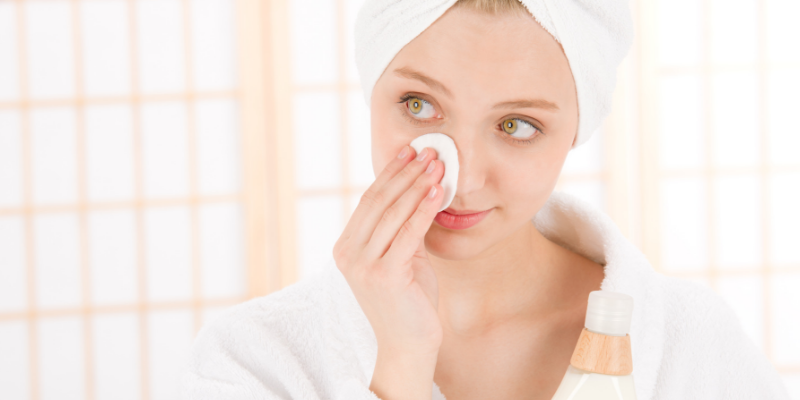Does Excessive Oil on Skin Cause Inflammation and Acne?

If you are one of the eight oily Baumann Skin Types®, you might feel that you are doomed to have acne. While people with increased sebum, or oil, on their skin are more likely to have clogged pores, studies have shown that the oil itself is not the root cause of acne. Therefore, having oily skin does not necessarily mean you will have acne, and having dry skin does not necessarily mean that you won’t ever get breakouts.
This article will explain the underlying causes of acne and what both dry and oily skin types can do to treat and prevent it.
Who Gets Acne?
Virtually anyone with a sensitive skin type can get acne. Acne usually starts with clogged pores (comedones) and progresses to papules, pustules, and maybe even cysts. Oily skin types are more likely to have clogged pores and develop comedones because the sebum causes the desquamated skin cells to stick together and clog pores. However, increased sebum production is not always associated with an increase in acne.
Increased Amounts of Sebum Production Are Not Required to Cause Acne
- acnes bacteria can cause acne even when oil (sebum) is not present on the skin. P .acnes bacteria causes acne when it binds to the Toll-like 2 receptor (TLR-2), which turns on an inflammatory cascade that is independent of sebum production. Retinoids block the activation of TLR-2, which is one of the many ways that retinoids prevent acne.
Dry Skin Can Predispose to Acne
People with dry, flaky skin have “impaired desquamation,” which means the skin cells are sticking together and not flaking off the skin. This can clog pores even in the absence of sebum. Clogged pores attract bacteria, which grows inside the pores and triggers an inflammatory response by activating Toll-like receptors. This inflammation causes papules and pustules (acne) on the skin. You can learn more about inflammation and the other types of sensitive skin it causes here.
What Causes Clogged Pores?
Increased sebum production and the use of comedogenic skin care ingredients like most forms of coconut oil can clog pores. Injury to the hair follicle from picking, dermaplaning or friction are other causes of clogged pores. Mechanical exfoliation such as microdermabrasion, cleansing scrubs and rough shower loofahs are not a good idea for people with acne. These are the reasons that many people have an acne break out after a facial if the aesthetician has not be specifically trained to treat acne.
While we do know that acne does have a genetic component, there are other factors that can also make skin more susceptible to acne, including a higher BMI, infrequent exercise, a high-sugar diet, comedogenic cosmetic product use, and sun exposure. Thus, a mixture of genetics and lifestyle factors can make you more or less susceptible to getting breakouts, regardless of whether or not your skin is oily or dry.
What Causes Acne, If It’s Not Oil?
Acne is an inflammatory skin disorder caused by:
- Clogged pores
- Increased P. acnes bacteria that activates “toll-like receptors” to lead to inflammation
A 2005 study published in the British Journal of Dermatology found that although acne was more prevalent in people with higher sebum levels, the amount and severity of acne was not affected by sebum level. In other words, oily skin types may be more prone to getting acne due to clogged pores, but the amount of oil on their skin does not affect how many pimples they might get. When pores are clogged, whether because of oil, dirt, or dead skin cells, both oily and dry skin types can experience the same amount of breakouts.
Researchers also pointed out that acne lesions can show up on any part of your face, whether you have dry or oily skin. While the T-zone (your forehead, nose, and chin) tends to be oilier, not all participants in this study developed pimples in that area. This further emphasizes the fact that oil is not an underlying cause of acne, but can aggravate it by clogging pores in some instances and therefore leading to bacteria growth, inflammation, and breakouts.
How Is Acne Treated?
The best approach to treat and prevent acne is to use the correct skincare products for your skin type that will keep your pores clear. Hydroxy acids such as glycolic acid and salicylic acid help to prevent the clogging of pores, while salicylic acid also helps to unclog them. These ingredients are known as chemical exfoliators and are safe and effective for most acne-prone skin. Some dry and sensitive skin types may not tolerate salicylic acid as well as glycolic acid, so a moisturizing glycolic acid cleanser such as Glycolix Elite 10% Moisturizing Cleanser or Essopi Glycolic 10% Moisturizing Cleanser may be the best choice in this case.
Alpha hydroxy acids like glycolic acid also lower the pH of your skin, which makes it harder for acne-causing bacteria to thrive. Most oily skin types can tolerate benzoyl peroxide, which can also be used to kill P. acnes bacteria and clear up acne.
Retinoids are the most important treatment for acne because they turn off the expression of TLR-2 and prevent clogged pores by regulating the keratinization/ desquamation process.
Bottom Line
Anyone can get acne, even if you have very dry skin. The key to managing acne is to learn your Baumann Skin Type, then follow the customized skincare routine that’s right for your skin’s unique characteristics – whether oily or dry, pigmented or non-pigmented, resistant or sensitive, or wrinkled or tight. To determine your Baumann Skin Type, find an STS-approved physician near you, or give Dr. Baumann’s Miami office a call at 305-532-5552.
Be sure to follow @BaumannCosmetic and @skintypesolutions on Facebook, Instagram, and YouTube for more skincare information and advice from Dr. Leslie Baumann, and to stay up-to-date on all the latest skin science.
©2018 MetaBeauty, Inc.


